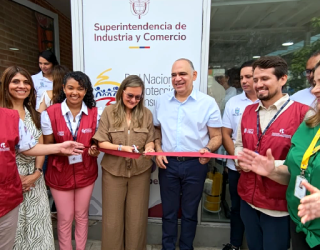Sic sanctions cartel in the liquor market

The Superintendence of Industry and Commerce (SIC), in its role as National Authority for Competition Protection, sanctioned ALIANZA MAYORISTA (ALIMA), DISPRESCO and INTERNACIONAL DE ABASTOS Y LICORES (INTERLICORES), after it was demonstrated that this companies implemented a system that restricted free economic competition in the market for the distribution of liquors produced by the FABRICA DE LICORES DE ANTIOQUIA (FLA), in the department of Antioquia, between 2010 and 2022.
In the same case, five (5) individuals were also sanctioned for having executed, authorized or facilitated the anticompetitive conduct.
Fines:
|
SANCTIONS IMPOSED BY THE SIC |
||
|
COMPANIES |
||
|
1 |
ALIANZA MAYORISTA S.A.S. – ALIMA |
$2.317.027.872 |
|
2 |
DISPRESCO S.A.S. – DISPRESCO |
$6.001.287.648 |
|
3 |
INTERNACIONAL DE ABASTOS Y LICORES S.A.S. - INTERLICORES |
$5.901.679.164 |
|
INDIVIDUALS |
||
|
1 |
HERNÁN GIL BARRIENTOS |
$24.018.528 |
|
2 |
LEONARDO DE JESÚS RAMÍREZ RAMÍREZ |
$257.857.140 |
|
3 |
ANDRÉS NICOLÁS LONDOÑO POSADA |
$282.825.768 |
|
4 |
NELSON ARTURO GIRALDO ÁLZATE |
$2.000.000.000 |
|
5 |
DAVID ESTEBAN GIRALDO PARRA |
$840.762.492 |
|
TOTAL SANCTIONS |
COP $17.625.458.612 |
|
The Case:
The SIC was able to probe the existence of an illegal agreement between ALIMA, DISPRESCO and INTERLICORES, through which the companies formed a TEMPORARY UNION, through which they continuously executed a series of agreements and strategies contrary to free competition, which are summarized below:
- Between 2010 and 2013, the main anticompetitive agreements executed by ALIMA, DISPRESCO and INTERLICORES through the TEMPORARY UNION were: (i) Indirect price fixing through discounts offered to customers; (ii) Distribution of participation quotas.
- The main function of the TEMPORARY UNION was to carry out the monitoring and follow-up of the restrictive agreements. Thus, two main administrative bodies of the TEMPORARY UNION were created: the manager and the board of directors.
- By late 2012, the companies identified breaches to the restrictive agreement, which led to a restructuring process of the TEMPORARY UNIÓN that ended on late 2013. Thus, a new operating model was reached.
- UNIÓN TEMPORAL's new operating model implemented an anti-competitive system through: (i) price fixing agreements through discounts; (ii) participation quota allocation agreements; (iii) agreements for the equitable distribution of clients and marketing areas; and (iv) the implementation of new unified commercial strategy and policy.



